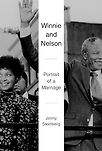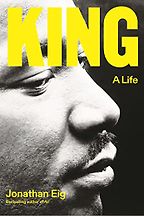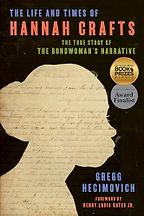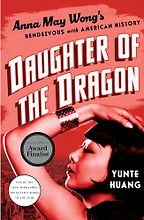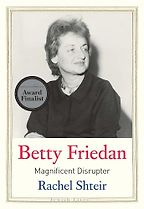It’s brilliant to have you back on the site—for the fourth time—to talk about the books that made the National Book Critics Circle shortlist for the best recent biography. Did you notice any trends among the submissions for the 2024 biography prize?
Biographies rarely break news, but two of our finalists did so months or years before publication. Still, in the eyes of our committee, biographies are not elevated by ‘scoops.’ This set of books, each in its distinctive way, contributed to a substantial revision of history.
Let’s talk about the finalists first, starting with Jonathan Eig’s biography of Martin Luther King Jr., King: A Life? The New York Times described it as “the first comprehensive account of the civil rights icon in decades.” Could you tell us why the judges thought it was one of the best biographies of 2024?
With new evidence, Eig enriches our understanding of King and rescues the civil rights leader from what he describes as “the gray mist of hagiography.” He traces the arc of “Little Mike,” son of a Georgia sharecropper, to national prominence as an eloquent advocate for Black rights, as well as a crusader against the Vietnam War and poverty, all the way to Memphis and the Lorraine Motel balcony. Building on more than 200 interviews and recently released FBI files, Eig made national news by debunking a famous quotation about Malcolm X attributed to King, tracks fissures in the civil rights movement, and reveals King’s womanizing.
Since the National Book Critics Circle announced its finalists, King: A Life was awarded a Pulitzer Prize. This year two prizes were conferred, and the other equally brilliant biography was Ilyon Woo’s Master Slave Husband Wife, which reconstructs an enslaved couple’s daring, arduous escape from Georgia in 1848 to freedom. Widely praised as a biographer, Jon Eig has written about iconic athletes, like baseball players Lou Gehrig (Luckiest Man) and Jackie Robinson (Opening Day), and more recently Muhammad Ali (Ali: A Life). He also wrote The Birth of the Pill: How Four Crusaders Reinvented Sex and Launched a Revolution, which has been adapted to the stage.
“This set of books, each in its distinctive way, contributed to a substantial revision of history”
Even with his track record of prodigiously researched biographies of 20th-century icons, we wondered whether Eig’s biography of King would substantially enrich our understanding of the civil rights leader, particularly after such robust Pulitzer Prize winners as David Garrow’s Bearing the Cross: Martin Luther King, Jr., and the Southern Christian Leadership Conference (Biography, 1987) and Taylor Branch’s Parting the Waters: America in the King Years 1954-1963 (History, 1989). Considering Eig’s King alongside the works of Garrow and Branch reveals that cradle-to-grave biographies are more than paint-by-number books. Within the constraints of that canvas, the shapes and hues can be wildly different. Considering these books together was an object lesson not only in interpretation but also in approach and reveals that new evidence is to be discovered and interpreted.
Next, you’ve selected The Life and Times of Hannah Crafts: The True Story of the Bondwoman’s Narrative by Gregg Hecimovich. It’s a biography, but it’s also a sort of detective story. Tell us more.
Yes, this is quite a detective story—the discovery of an unpublished 19th-century manuscript, and then the historical excavation work to identify its author by more than her pen name. This is biography as active team sport!
Brief background: About two decades ago, Harvard scholar Henry Louis Gates Jr. purchased a handwritten, unpublished manuscript titled The Bondswoman’s Narrative at an auction. He authenticated the gathered pages, handwritten in the 1850s by a woman using the name Hannah Crafts. Thought to be the earliest novel by a Black, it was a harrowing saga describing the cruel abuse the protagonist endured before escaping to freedom.
In detailing these horrors of her daily life, the author left clues to her true identity. Furman University professor Hecimovich worked with the tools of a gumshoe, the sensibilities of a literary scholar, the nuanced perspective of a historian, and the congeniality of a tour guide as he shared with readers his search through public records, handwritten diaries and almanacs, wills, and slave inventories. He finally revealed the writer to be Hannah Bond, who had learned to read and write as an enslaved house servant in North Carolina before escaping to the North.
Yunte Huang’s Daughter of the Dragon: Anna May Wong’s Rendezvous with American History tells the life story of the first Chinese American film star, charting her “spectacular rise from laundryman’s daughter to global celebrity against the backdrop of a world riven by racism, bigotry, and injustice.”
Anna May Wong’s likeness appears on a U.S. silver quarter, yet today she is largely forgotten. Huang’s biography, though, is more than an act of reclamation. Daughter of the Dragon is the capstone in Huang’s ambitious trilogy—each an NBCC finalist—spotlighting Asian American cultural icons, starting with fictional Honolulu cop Charlie Chan, then the original Siamese twins, Chang and Eng Bunker.
That’s right, I remember we discussed Inseparable back in 2019. Could you talk us through this new book?
We admired Huang’s deftly drawn portrait of Wong. A beguiling and unique beauty, Wong rose to prominence in the swirl of anti-Asian hostility. In his deeply researched biography, Huang argues that Wong was seen as too Asian by some and too American by others, and that she overacted to explode stereotypes of Asian Americans. He explains the “delicate dance between stereotype and imagination, convention and subversion” that has made Anna May Wong “both revered and reviled.”
“Between Madame Butterfly and the dragon lady, there lies the alluring art through which Anna May continues to haunt us all,” Huang writes.
The fourth book on your shortlist is Betty Friedan: Magnificent Disrupter by Rachel Shteir. Why is it one of the best biographies of 2024?
Betty Friedan’s The Feminine Mystique challenged the midcentury myth of suburban women’s domestic fulfillment, tapped into the often-inchoate frustrations of housewives and mothers, and ignited the second wave of the ‘contemporary’ women’s movement when it was published in 1963.
Friedan’s manifesto sold more than a million copies and won legions of fans who had silently shouldered the drudgery of housework and the glorification of motherhood. Yet, within a few years, Friedan was mocked and shunned by younger feminists who protested that she was too white and middle-class, and that her focus on legal and economic equality was too narrow.
Through nearly 100 interviews with those who knew Friedan and her own deep archival research, Shteir argues for an understanding of Friedan beyond her image as a pugnacious rebel detached from the newer generation of feminists like Gloria Steinem.
Shteir’s biography is a perfect fit for Yale University Press’ Jewish Lives series, as she captures young Betty Friedan, a “short, pudgy bibliophile” and a precocious Jewish girl from a Reform, upper-middle-class family in St. Louis, as she endured hostility and anti-Semitism.
Interested in labor, unions and theater, Friedan was a quarrelsome nonconformist with a temper who graduated from Smith College, was a fractious founder of the National Organization for Women, visionary and paranoid, unyielding in continuing conflicts that by her death in 2006 had cemented her image as uncompromising and resistant to a capacious women’s movement — one that was in sync with calls for racial equality and anti-war activity. Shteir’s recognition of her accomplishments and appreciation of her principles go a long way to rewrite Friedan’s life and legacy.
That brings us to this year’s winning book: Winnie and Nelson: Portrait of a Marriage by Jonny Steinberg. It’s a dual biography of the Mandelas—including the long years spent apart while he was imprisoned during the Apartheid regime. Tell us about why you and your fellow critics feel it to be the best biography of 2024.
Winnie and Nelson is more than a dual biography. In his powerful book, Jonny Steinberg, a South African journalist, penetrates the mythology of the Mandelas’ fraught marriage to tell the story of apartheid.
Steinberg writes a portrait of the Mandela marriage as a window to a country struggling to come to terms with itself. Both Nelson and Winnie Mandela were wounded souls, deeply scarred by apartheid, by the time they met at a bus stop in the Black township of Soweto. Social worker Winnie was just 20 years old, and Nelson was nearly two decades her senior, married, a father of small children, and was on trial for treason when they married 15 months later. During his nearly three decades of imprisonment, Winnie was allowed to visit only a few times, and she became more militant and prone to violence as Nelson became more conciliatory.
The author of earlier books about South Africa and its transition to democracy, Steinberg shares with readers his discomfort in benefiting from transcripts of secretly taped, verbatim transcripts of Mandela’s conversations with his few visitors—Winnie, his children, and government officials, with whom he discussed secret matters—including one who stole the transcripts which eventually ended up in a private collection.
Steinberg is empathic in his depictions of Winnie and Nelson Mandela, and it is painful to read about this deeply wounded couple, battling both the state and one each other.
You have another very varied biography shortlist for 2024. What do you think brings it together? What are you looking for, when you look for the best biographies of the year?
Ezra Pound famously observed that poetry is “news that stays news.” The same can be said for biography. These works of biography illustrate that the boundaries between history and news are porous, and that new evidence can be uncovered from both the best-known figures and the obscure.
Interview by Cal Flyn, Deputy Editor
January 10, 2025. Updated: January 11, 2025
Five Books aims to keep its book recommendations and interviews up to date. If you are the interviewee and would like to update your choice of books (or even just what you say about them) please email us at [email protected]
Five Books interviews are expensive to produce. If you've enjoyed this interview, please support us by donating a small amount.

